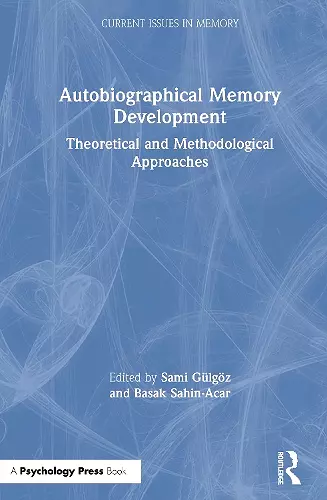Autobiographical Memory Development
Theoretical and Methodological Approaches
Sami Gülgöz editor Basak Sahin-Acar editor
Format:Hardback
Publisher:Taylor & Francis Ltd
Published:10th Jun '20
Currently unavailable, and unfortunately no date known when it will be back
This hardback is available in another edition too:
- Paperback£46.99(9780367077884)

Autobiographical memory is constituted from the integration of several memory skills, as well as the ability to narrate. This all helps in understanding our relation to self, family contexts, culture, brain development, and traumatic experiences. The present volume discusses contemporary approaches to childhood memories and examines cutting-edge research on the development of autobiographical memory.
The chapters in this book written by a group of leading authors, each make a unique contribution by describing a specific developmental domain. In providing a multinational and multicultural perspective on autobiographical memory development—and by covering a variety of theoretical and methodological approaches, this state-of-the-book is essential reading on the autobiographical memory system for memory researchers and graduate students. It is also of interest to scholars and students working more broadly in the fields of cognitive, developmental, and social psychology, and to academics who are conducting interdisciplinary research on neuroscience, family relationships, narrative methods, culture, and oral history.
What a feast! This collected volume is full of fascinating ideas and new findings about the development of autobiographical memory. It covers diverse topics ranging from neurological mechanisms to sociocultural influences, from how young children learn to tell personal stories to how adults recollect childhood experiences, and from the purposes and functions of memory to the errors and pitfalls of remembering. It provides in abundance theoretical insights and methodological strategies. The collective work demonstrates that the development of autobiographical memory is a process of cognitive achievement and sociocultural scaffolding. I recommend this book to all students of memory. - Qi Wang, Ph.D, Professor and Chair of Human Development, Cornell University; Author of The Autobiographical Self in Time and Culture
I was excited to see a compendium of diverse views with the leading figures who study the developmental psychology of autobiographical memory. The list of senior chapter authors is extremely impressive, including Professors Bauer, Bluck, Bohn, De la Manta-Benitez, Fivush, Grysman, Gülgöz, Haden, Krojgaard, Leichtman, Peterson, Pillemer, and Şahin-Acar. The chapters are authoritative and well written, providing excellent summaries, while often challenging existing views. Highly suitable for researchers, advanced undergraduate and graduate students, and for courses in development and autobiographical memory. - David Rubin, Ph.D., Juanita M. Kreps Distinguished Professor of Psychology and Neuroscience, Duke University; Author of Memory in Oral Traditions
This book delves into autobiographical memory development from multiple angles and with an international perspective. The reviews are readable, concise, and contain the latest findings on the social, cultural, cognitive, linguistic, historical, and biological influences on autobiographical memories. My recommendation is for researchers and students of memory development to read this book from cover to cover. You will come away with new insights and a deeper appreciation of the complexity of human memory and its development. - Elaine Reese, Ph.D., Professor of Psychology, University of Otago; Author of Tell Me a Story: Sharing Stories To Enrich Your Child's World
This book describes recent advances and novel perspectives in the prospering field of autobiographical memory development. It provides a unique and timely overview of a range of approaches and theoretical views, including in-depth discussions of the role of parent-child conversation, the neural basis of autobiographical memory development, the use of non-verbal and narrative methods for assessing children’s memories, the characteristics and functions of early memories as well as memory in the context of education, culture and trauma. This multifaceted fusion of chapters is an excellent resource for both specialists and novices in the field. - Dorthe Berntsen, Ph.D., Professor at the Department of Psychology and Behavioural Science & —Head of the Center on Autobiographic Memory Research (CON AMORE), Aarhus University
This astounding collection of innovative contributions invites readers to enter the thriving world of ideas and findings of how we learn to remember when growing up. Renowned researchers from Europe and the US explore the social and cultural dynamics of learning how to remember. Rich examples illustrate the central developmental mechanism of shared reminiscing of children and their parents. This path-breaking volume is a must-read for scholars and lay-persons interested in the development of remembering. - Tilmann Habermas, Ph.D., Professor of Psychology, Goethe University Frankfurt; Author of Emotion and Narrative: Perspectives in Autobiographical Storytelling
ISBN: 9780367077853
Dimensions: unknown
Weight: 453g
210 pages